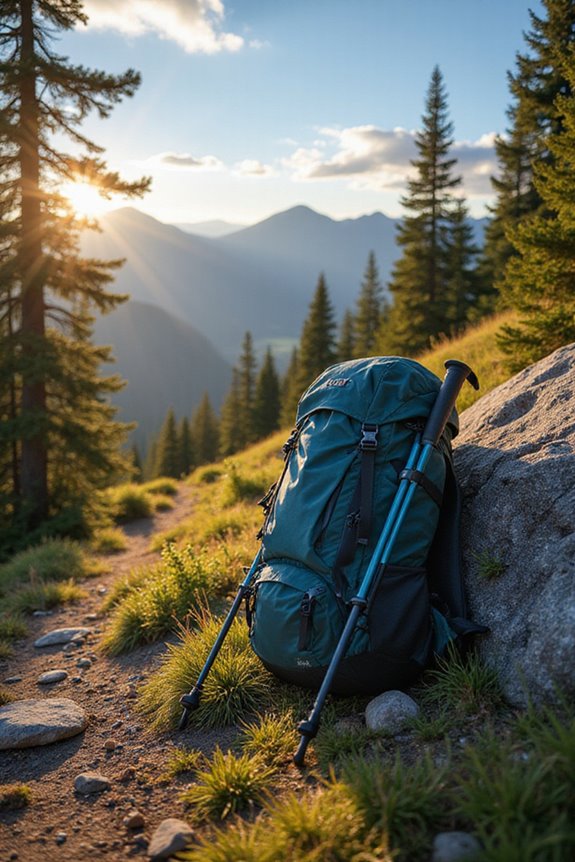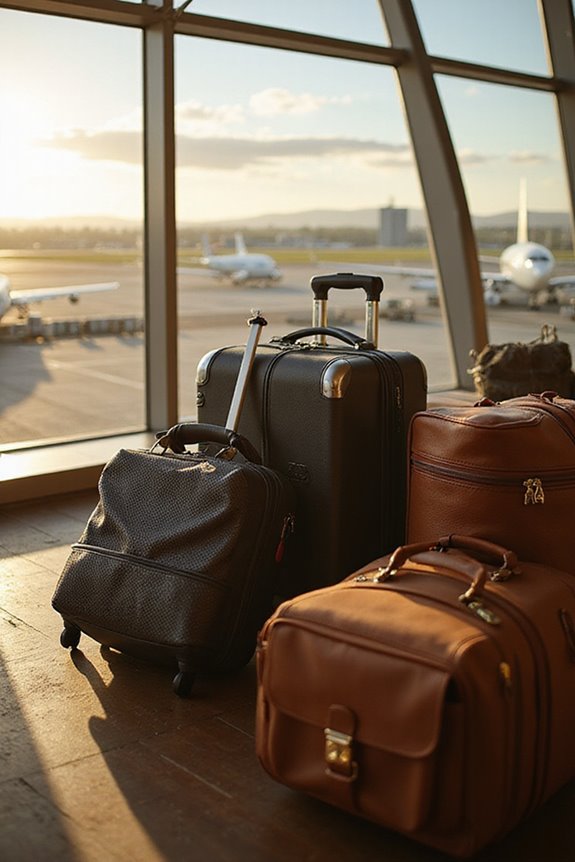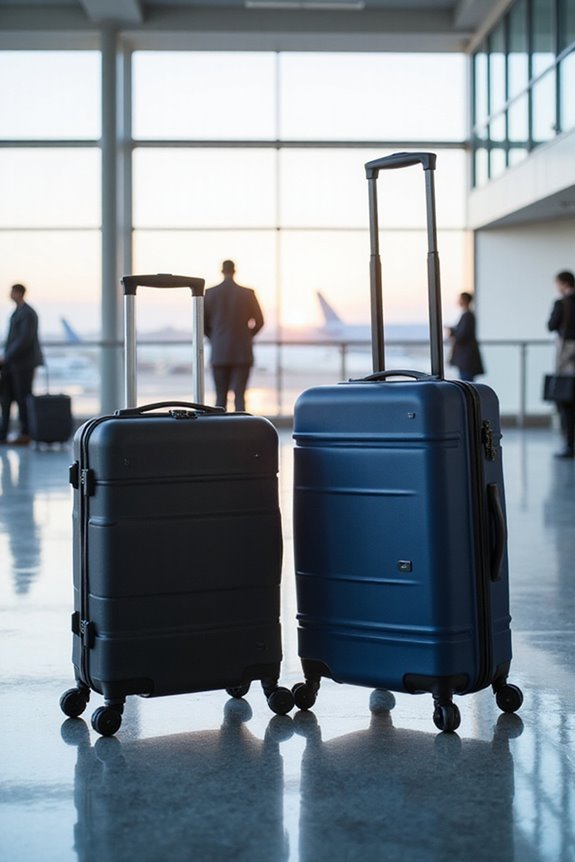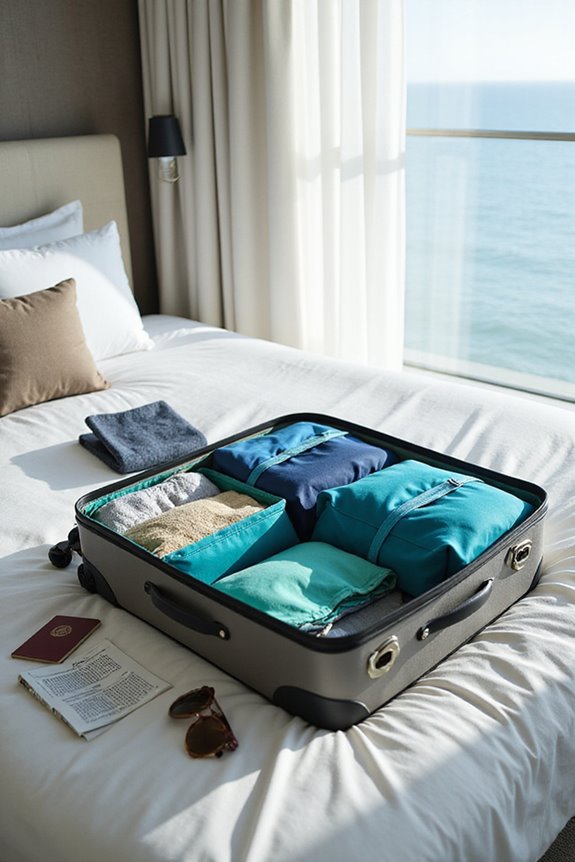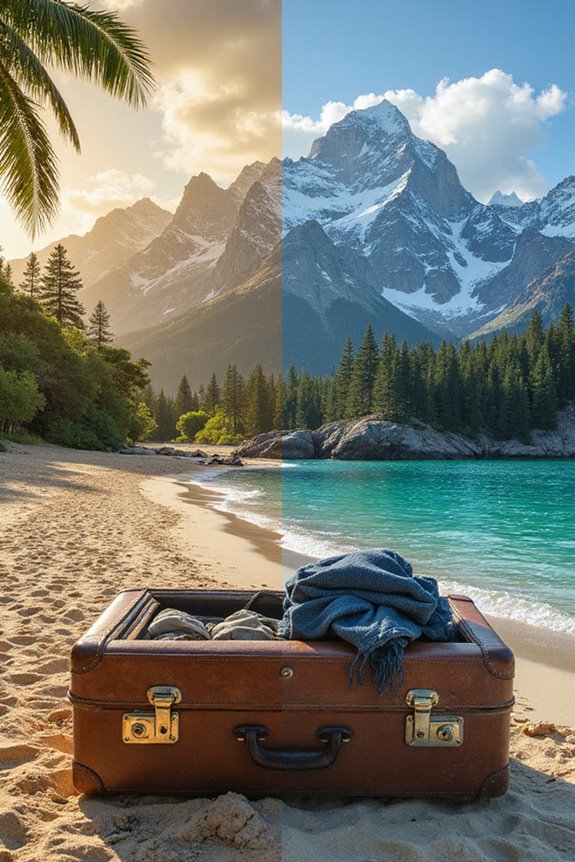Finding the right backpack size for hiking can feel like trying to solve a puzzle, but it’s key for a comfy trek! I always measure my torso from the C7 vertebra to my iliac crest—trust me, it makes a huge difference. For day hikes, packs around 20-30 liters work great, while weekend trips need at least 40 liters. Plus, a good fit with adjustable straps and hip belts is a game changer—want more tips?
Key Takeaways
- Measure your torso length accurately from the C7 vertebra to the iliac crest for the best backpack fit.
- For short hikes, choose a pack under 20 liters; for all-day adventures, opt for 20 to 30 liters.
- Weekend trips typically require packs between 30 to 40 liters to accommodate camping gear comfortably.
- Ensure a well-fitted hip belt and adjustable shoulder straps to distribute weight and enhance comfort.
- Look for backpacks with internal frames and good suspension systems to improve support and reduce sweat buildup.
Understanding Torso Length for Backpack Sizing
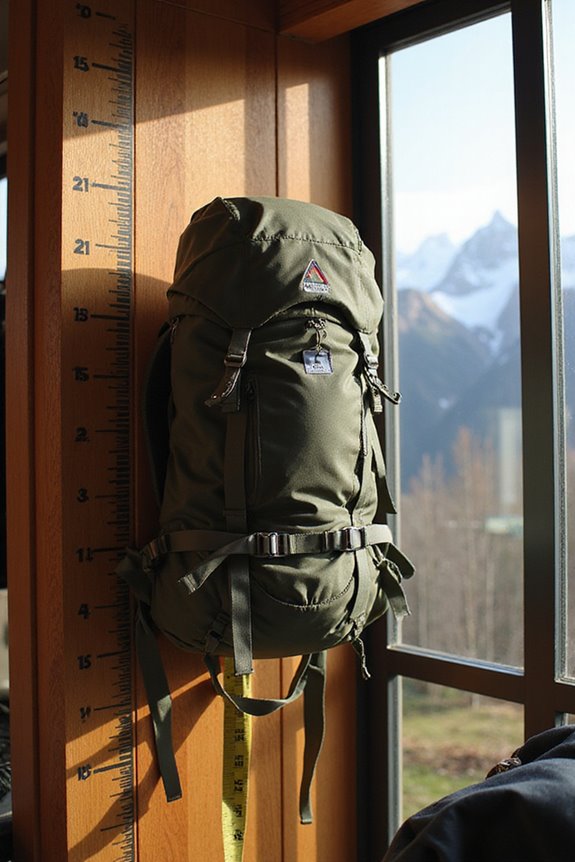
When it comes to choosing the right backpack for hiking, understanding your torso length is a game-changer. Trust me, measuring from your C7 vertebra—just that bony bump at the base of your neck—to your iliac crest can make all the difference. I remember the first time I did it; I was amazed at how much more comfortable my pack felt! You hold the tape measure so it runs straight down your spine, and bam—suddenly you’re opting for a pack that fits you like a glove. Forget height—torso length is the real MVP here! Using solid fitting techniques guarantees you won’t end up with shoulder strain or back pain halfway up the trail. Moreover, choosing a pack with proper sizing options ensures your comfort on longer hikes. Give it a try; your back will thank you!
Backpack Size Categories Based on Volume
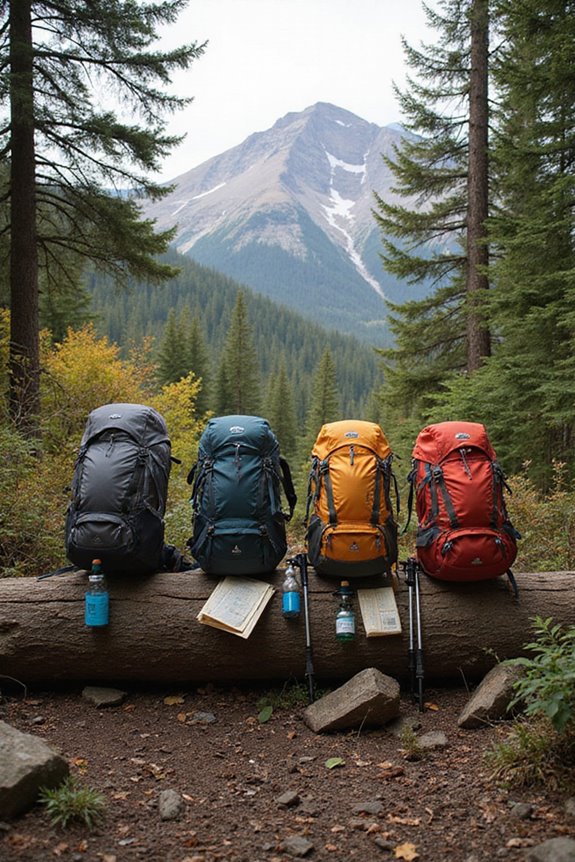
Choosing the right size backpack for your hike is like finding the perfect pair of shoes—get it wrong, and you’re in for some serious discomfort! When it comes to backpack volume, it really makes a difference. For short hikes, an ultralight pack under 10 liters works great, holding just the essentials, like snacks and a jacket. If you’re day hiking, consider a small daypack (11-20 liters) for added organization. I find the medium packs (21-35 liters) to be the sweet spot, offering enough room for food and gear without overloading me. For heftier adventures, you’ll want something larger, like a 36-50 liter pack, ready for serious gear and heavier pack weight. Choose wisely, and enjoy your hike!
Choosing the Right Pack for Trip Duration
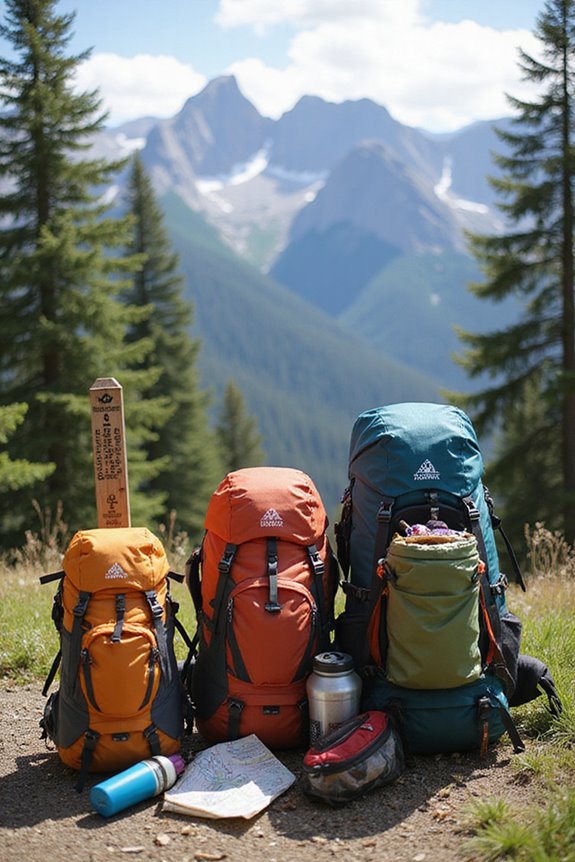
So, you’ve got your backpack size figured out based on volume—great job! Now, let’s chat about trip duration and how it shapes your choice. For those quick hikes lasting just a few hours, I usually grab a pack between 10 to 25 liters. It’s perfect for my essential items like a water bottle, snacks, and a lightweight jacket. For all-day adventures, I opt for 20 to 30 liters, giving me room for extra snacks and weather gear without feeling overloaded. If I’m heading out for a weekend, I jump up to 30 to 40 liters, fitting camping gear and a cozy sleeping bag. Remember, the right hiking gear makes every step lighter and more enjoyable!
Fit Considerations Beyond Pack Capacity
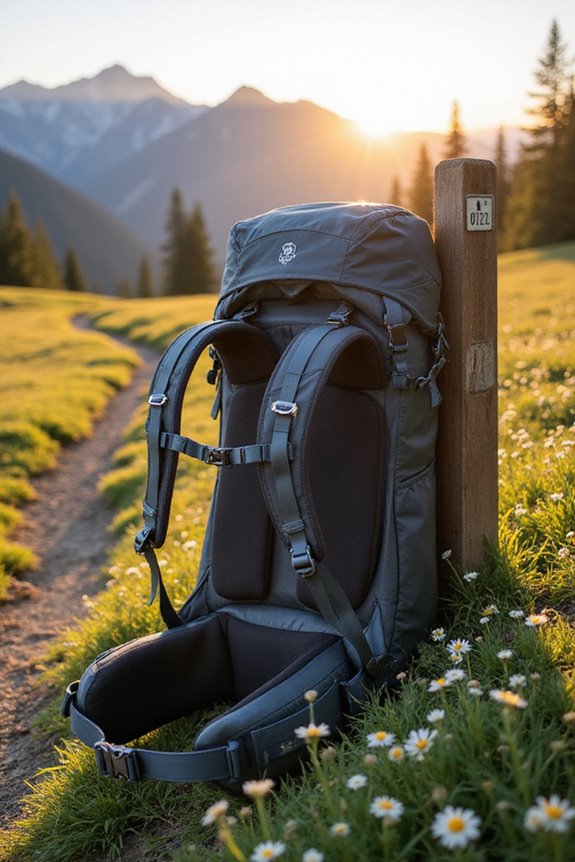
If you think picking the right size backpack is all there is to it, you’re in for a surprise—fit matters just as much, if not more! A well-fitted hip belt is essential; it should hug your waist, transferring about 80% of the pack’s weight away from your shoulders. Adjustable shoulder straps help secure the load without chafing, ensuring comfort as you move. When choosing pack frame types, I’ve found internal frames offer better support, hugging your back closely. Don’t forget about fit features like sternum straps and load lifters to fine-tune everything. And let’s face it, a pack with a good suspension system not only feels lighter but also helps prevent that dreaded sweaty back!
Measuring Torso Length Accurately
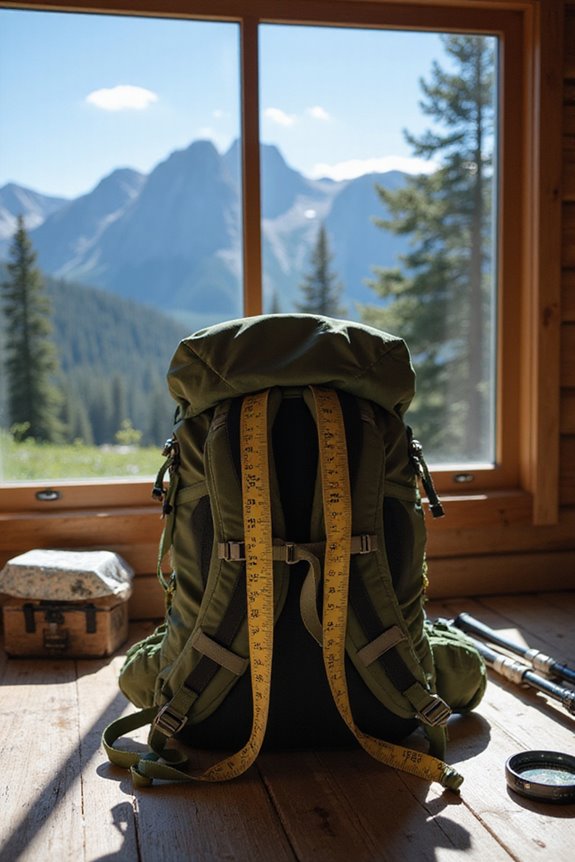
When it comes to finding the perfect backpack for hiking, properly measuring your torso length is essential—after all, you wouldn’t want to end up with a pack that feels like it’s trying to pull you backward down the trail! To get it right, use some torso measurement techniques: first, locate your C7 vertebra by bending your head forward—it’s that bony bump at the base of your neck. Next, find your iliac crests by placing your fingers on your hips. When you measure, follow the curve of your spine with a flexible tape measure, keeping it relaxed (no need to pull too tight!). A common measurement mistake is going solo, so grab a friend to help you out. Trust me, it makes all the difference!
The Importance of Trying Packs Before Purchase
So, don’t skimp on comfort evaluation. Visit stores with flexible return policies, and try on several styles. You’ll thank yourself later when you’re hiking in bliss instead of battling back pain!
Frequently Asked Questions
Can I Use a Larger Backpack for Shorter Trips?
Absolutely, I’ve used a larger backpack for short trips. The larger capacity offers benefits like flexibility, but I always weigh those against the potential for overpacking and discomfort. It’s a balance I keep in mind!
How Do I Clean and Maintain My Backpack?
To clean and maintain my backpack, I focus on the materials, using gentle cleaning techniques. I empty it out, gently scrub with mild soap, and always air dry to preserve its integrity and functionality.
What Features Should I Look for in a Hiking Backpack?
Did you know 90% of hikers cite comfort as key? So, I always look for durable backpack materials, ample compartments for hiking essentials, and ventilation features. These make every adventure smoother and more enjoyable for me.
How Much Weight Can I Comfortably Carry in My Backpack?
When considering how much weight I can comfortably carry, I focus on proper weight distribution and my personal comfort. Generally, I aim for around 20% of my body weight to guarantee a pleasant hiking experience.
Are There Specific Brands Recommended for Backpack Durability?
Isn’t it essential to choose wisely for durability ratings when selecting a backpack? I’ve found brand comparisons show Osprey and Gregory stand out, while ULA and Granite Gear offer impressive durability, ensuring tough adventures don’t wear them down.

